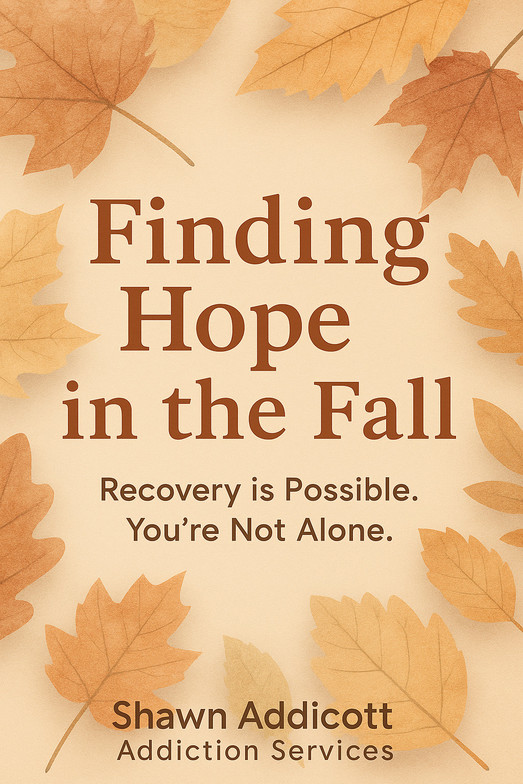
Finding Hope in the Fall: A Practical Guide to Relapse Prevention
Seasonal changes bring stress, learn evidence-informed relapse prevention tips for individuals and families in Waterloo Region navigating substance use.
As the crisp air of autumn settles over Waterloo Region and daylight hours shrink, many find their routines shifting. These seasonal changes, shorter days, colder evenings, and renewed responsibilities can unsettle even long-standing recovery habits. For individuals and families navigating substance use, this time of year can present unique challenges. But with compassion, planning, and evidence informed supports, you don’t have to face it alone.
Below is a practical, local context guide to staying steady through the fall season.
- Map and Monitor Your Triggers
- One helpful first step is mapping the likely triggers you’ll face in the coming months. These might include:
- Seasonal stressors (holidays, financial pressures)
- Emotional states (loneliness, grief, boredom)
- Social settings (fall gatherings, sports events, school stress)
- Weather & daylight (feeling more isolated indoors)
Weather & daylight (feeling more isolated indoors)
Once you identify 2–3 high risk triggers, pair each with a preplanned coping response: a grounding exercise, contact with a support person, stepping outside for fresh air, or journalling. Document this in a visible place (phone reminder, sticky note on fridge) to reduce reactive decisions.
Because relapse often follows predictable stress patterns, this kind of “early map” gives you extra buffer time to intervene.
Build a Steady Daily Recovery Rhythm
Recovery is sustained by small, consistent habits more than occasional big actions.
Body Sleep window (e.g. 10 pm–6 am), drink water first thing, 5–10 min movement/stretch Regulates mood and reduces impulsivity.
Mind Journalling, 15 mins of reflection or prayer, daily check-in with feelings Builds awareness of creeping stress
Connection One short “how are you?” message, call with accountability partner, attend a group Reduces isolation risk
Keeping your rhythm consistent helps resist the drift into relapse when external stresses increase.
Understand and Use Harm Reduction Tools
Even as recovery is the goal, harm reduction remains a practical bridge for many. In Waterloo Region, resources include needle/syringe programs, free naloxone kits, and community-based overdose education.
Key evidence-based supports include:
- Naloxone distribution: Reverses opioid overdoses and saves lives.
- Opioid agonist therapy (OAT): Using methadone or buprenorphine/naloxone (Suboxone) reduces cravings and stabilizes recovery.
- Community harm reduction programs: Offer nonjudgmental connection and education.
If you or a loved one are using substances, these tools can reduce immediate harm while supporting connection to treatment. Compassion, not judgment, should guide their use.
Reach Out — Local Supports in Waterloo RegionYou don’t have to navigate this path alone. Here are a few regional resources you or your family can explore:
- Here 24/7 — the central intake to mental health, addictions, and crisis services in Waterloo–Wellington.
- Addiction treatment programs, residential, outpatient, and community services throughout the region.
- House of Friendship, provides counselling, addiction treatment, and wraparound supports.
- Youth & Family Support via Ray of Hope and family navigators at Grand River Hospital.
Key Takeaways
- Seasonal shifts often expose relapse risks—anticipation is prevention.
- Daily structure (body, mind, connection) strengthens recovery.
- Harm reduction saves lives and bridges the path to healing.
- Community connection and faith informed care can provide stability.
- You don’t have to face this season alone, help is here.
Call to Action
If you’re navigating substance use or supporting a loved one, Shawn Addicott Addiction Services is here for compassionate, evidence-informed help.
Reach out today to book a consultation, talk through options, or find your next step.
Recovery is Possible. You're Not Alone


